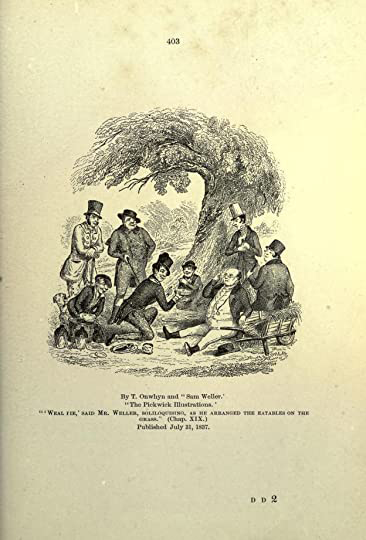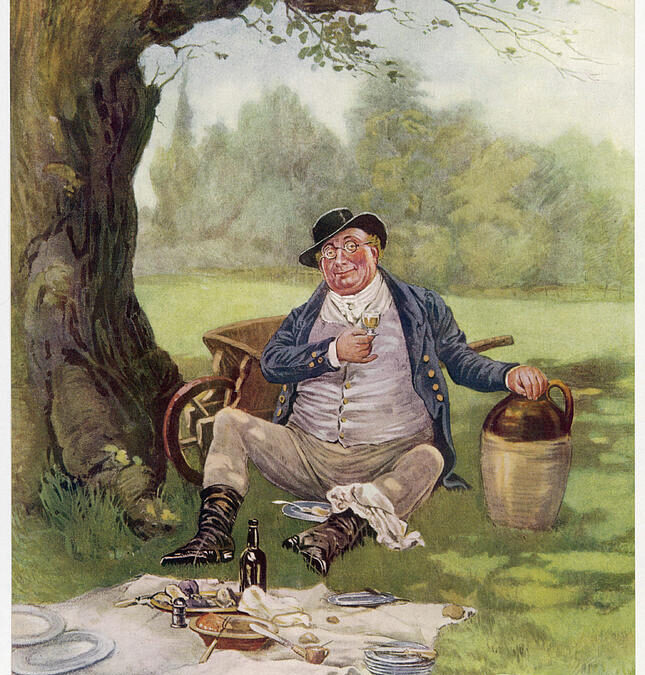“A Pleasant Day With An Unpleasant Termination” is Dickens’s comic send-up of the Halt on the Hunt, particularly Jean-Anthelme Brillat-Savarin’s The Physiology of Taste, or Meditations on Transcendental Gastronomy (1825). Much of the comedy hinges on the answer to Brillat-Savarin’s often-quoted question, “Tell me what kind of food you eat, and I will tell you what kind of man you are.” Dickens’s answer is “weal pie,” made from London’s finest kittens.
Point for point, Dickens satirizes Brillat-Savarin’s hunt luncheon, repas de chasse. It is not a meal that is an “emanation of heaven” but a pedestrian lunch. Pickwick is anchored to a wheelbarrow because he suffers from rheumatism and ill-fitting shoes. Brillat-Savarin describes the hunters’ lady friends arriving in carriages. Pickwick is pushed by his valet Sam Weller. Brillat-Savarin’s hunters drink cold white wine and champagne; Pickwick gets drunk on spiked punch.
Brillat-Savarin’s party is vivacious. Pickwick falls in a stupor. Brillat-Savarin’s food is elegant: pâtés de Perigord, a turkey with transparent jelly, salad, and cheese. Dickens opens a basket of veal pies, the virtues of which and the recipe for is provided by Weller in Cockney dialect: Weal pie,’ said Mr. Weller, soliloquising, as he arranged the eatables on the grass. ‘Wery good thing is weal pie, when you know the lady as made it, and is quite sure it ain’t kittens; and arter all though, where’s the odds, when they’re so like weal that the wery piemen themselves don’t know the difference?’ Don’t they, Sam?’ said Mr. Pickwick.’ Not they, sir,’ replied Mr. Weller, touching his hat. ‘I lodged in the same house with a pieman once, sir, and a wery nice man he was—clever reg’lar chap, too—make pies out o’ anything, he could. “What a number of cats you keep, Mr. Brooks,” says I when I’d got intimate with him. “Ah,” says he, “I do—a good many,” says he, “You must be wery fond o’ cats,” says I. “Other people is,” says he, a-winkin’ at me; “they ain’t in season till the winter, though,” says he. “Not in season!” says I. “No,” says he, “fruits is in, cats is out.” “Why, what do you mean?” says I. “Mean!” says he. “That I’ll never be a party to the combination o’ the butchers, to keep up the price o’ meat,” says he. “Mr. Weller,” says he, a-squeezing my hand wery hard and vispering in my ear—”don’t mention this here agin—but it’s the seasonin’ as does it. They’re all made o’ them noble animals,” says he, a-pointin’ to a wery nice little tabby kitten, “and I seasons ’em for beefsteak, weal or kidney, ‘cording to the demand. And more than that,” says he, “I can make a weal a beef-steak, or a beef-steak a kidney, or any one on ’em a mutton, at a minute’s notice, just as the market changes, and appetites wary!”‘

Thomas Onwhyn. “‘Weal pie,’ said Mr. Weller, soliloquizing, as he arranged the eatables on the grass.”
Dickens ends his picnic with Pickwick in a stupor. Capt Boldwig, a fierce little man, accuses Pickwick of trespass. Who are you, you rascal?’ said the captain, administering several pokes to Mr. Pickwick’s body with the thick stick. ‘What’s your name?’
‘Cold punch,’ murmured Mr. Pickwick as he sank to sleep again.
‘What?’ demanded Captain Boldwig.
No reply.’ What did he say his name was?’ asked the captain.
‘Punch, I think, sir,’ replied Wilkins.
‘That’s his impudence—that’s his confounded impudence,’ said Captain Boldwig. ‘He’s only feigning to be asleep now,’ said the captain, in a high passion. ‘He’s drunk; he’s a drunken plebeian. Wheel him away, Wilkins, wheel him away directly.’
Where shall I wheel him to, sir?’ inquired Wilkins with great timidity.
‘Wheel him to the devil,’ replied Captain Boldwig.
And so, Pickwick is carted off to jail.
Featured Image: Frederick Barnard.” ‘Come Gentlemen,’ continued Mr. Pickwick, still retaining his hold upon the jar, ‘A Toast: Our Friends of Dingley Dell.'”
See Charles Dickens. The Posthumous Papers of the Pickwick Club, vol. 1 (1836); http://www.gutenberg.org/files/580/580-h/580-h.htm; https://archive.org/details/postpapers01dickuoft; Robert Seymour. “Mr. Pickwick in Chase of his Hat,” https://archive.org/stream/postpapers01dickuoft/postpapers01dickuoft_djvu.txt; Thomas Onwhyn. Illustrations to the Pickwick Club by Sam Weller. London: E. Grattan, 1837; Frederick Barnard Ten Characters from Dickens. London: Cassell, 1879.

